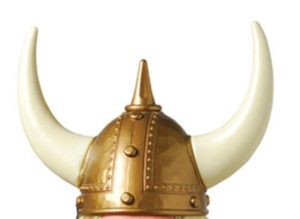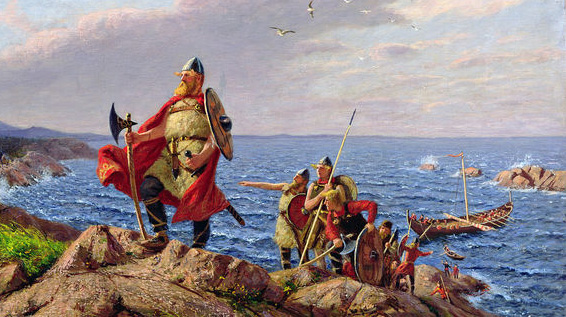There is no such thing as a Viking surname.

True hereditary surnames were only introduced in Scandinavia in the late 18th century, more than 700 years after the heyday of Viking expansion. Hereditary surnames still don’t exist in that most Viking of countries, Iceland, where personal names continue to last only a single generation. In Iceland, my son Herbert would be Herbert Johnson and his son John would be John Herbertson.
So why does Sean de Bhulbh’s magisterial Sloinnte na héireann: Irish Surnames list no fewer than 97 Irish names that have Norse or Viking roots? All the stranger when you consider that surnames only began to be widely adopted in Ireland from the 11th century, well after Viking power in Ireland was broken.

But there is no doubt about the origins of these names: McAuliff, son of Olaf; Groarke, Mag Ruairc, son of Hrothkekr; McBirney, son of Bjorn; Reynolds, Mac Raghnall, from the Norse first name Ragnall. Some might have originated with Gaels imitating their neighbours, but the simplest explanation is that Viking settlers adopted Gaelic naming practices, dropping their own single-generation names.
Other Norse-origin names provide evidence of the importance of those naming practices. Doyle is Ó Dubhghaill, from dubh, “dark”, and gall, “foreigner”, a descriptive formula first used to describe the invading Vikings, and in particular to distinguish darker-haired Danes from fair-haired Norwegians. O’Loughlin and Higgins both stem directly from words meaning literally “Viking”, Lochlann in Irish and Uigínn, an Irish version of the Norse Vikinger. These names were public badges of otherness, the equivalent of arriving in England with a passport saying “Johnny Foreigner”. But families were perfectly prepared to adopt and endure them, a measure of just how intense was the need to have a hereditary and patronymic surname in medieval Ireland.
We adopted them early and we adopted them with gusto. Extended family networks were the very essence of Gaelic society: what better way of flagging your network than embodying it in your name?
Which is why there are no Viking surnames except for Irish Viking surnames
No kidding! Very interesting. I like it! Thanks John ! ☘️
Most intriguing! Thank you.
Having done extensive Danish research into my father’s family I can agree wholeheartedly. My paternal grandfather was the first in that branch to adopt his father’s surname of Jensen and he was born in 1893!
So, what would the origin of the surname Loughnane be?
The common Irish name Seán represents the Norman French pronunciation of Jean [John] and the spelling of Norse names in the Irish annals clearly shows various modifications of Norse sounds to accord with Irish norms. The Irish of the ninth century and later did not have problems with intermarriage or with adoption of new names and phrases and as far as we can trace them in the genealogies, most of the “Norse” surnames derive from ancestral Irishmen who just happened to be christened with Norse originating names. In the same way, the Norse of Iceland were quite happy to adopt names such as Njal (Niall) and Kormac which were bestowed on locals who had no documented contact with Ireland or Irish people. Most of the sense of foreign”otherness” which surrounds this topic in Irish historiography was introduced by scholars working in the heyday of the Irish cultural independence movement in the late nineteenth and early twentieth centuries and is not visible in the medieval documentation while modern DNA studies are adding to the confused “noise” which is obscuring the original evidence.
Very good and under stood. Thank you. Is Patrice a man or girls surname?
Couldn’t agree more on the practise of borrowing surnames, it’s not much different from how modern Irish people today might have names of all sorta origin (Biblical, classical etc.)
What I would add is that when comprehensive Y-DNA testing is done (67 or 111 STR’s and BigY) that if anything it reinforces that most of these so called ‘Viking names’ are actually branches of Irish kindred groups.
Good example I can think of is the surname McManus. If you look in Woulfe there were at least two major families bearing the name, one a branch of the O’Connor’s of Connacht (via Magnus Ua Conchobair) the other a branch of the Maguires. (Magnus son of Donn Mag Uidhre?) Obviously relevant genealogies show up in for example Mac Fhirbhisigh etc.
Unsurprisingly in relevant databases we see that men with surname McManus who have done comprehensive testing tend to fall into two major clusters (there are smaller ones as well), one cluster shows close match with men bearing the surname O’Connor and other west of Ireland surnames (generally names associated with the Uí Briúin). The other clusters with Maguires and other Fermanagh surnames (including McAuley another Maguire branch with a norse personal name in mix)
In neither case do we see men bearing the surname match with people with more modern origins in Scandinavia.
Very interesting. You may be aware of the Swedish colony that went to Pennsylvania/New Jersey/Delaware area in 1638. They too adopted hereditary surnames upon their arrival in America. Many theories about the names they chose, most were based on paternal names, such as Bengtson, which evolved to Bankson and the original settler was probably the son of Bengt. Also some were supposed to have adopted the name of the place they came from. Early Swedish names in America included Rambo, Cock, Bonde, Dalbo, Gunnarsson, Hendricksson, Hansson. For more information, see : http://colonialswedes.net/History/Chronology.html
Interesting!
My husband is a red-haired Mc Laughlin!
Very different origin(s) from O’Loughlin I believe.
My mother was a red haired McLaughlin!
This increased my understanding of my Norse ancestral names as well, thank you.
Any chance that the family names McCluskey and Quinn can be traced back to the Vikings?
No.
McCluskey is an Irish name originating around 1196 in the Roe River valley and is a sub-sept of the O’Cahans.
Quinn is an anglicized version of Ó Coinn.
Some friendly Vikings wishing to assimilate may have taken McCluskey or Quinn daughters as wives. There may have been affairs when a Viking father was not named, but the child retained the mother’s surname and some of the father’s genetics.
Great information – thank you.
Herbert Johnson; very Beano-ish!
My mother has been told by Irish people that her Irish Viking name is not Irish: Histon, or Ó h-Oistín.
Cool! So my Dublin ancestors were “dark foreigners.” I like it!
Just wondering if a first name of Loughlin (Lot) is a nod to Viking heritage?
Fascinating.
Like the use of terms “single generation” and “hereditary” for surnames as passed down generations. So clear to understand rather than using Patronymic etc.
How Scandinavian are Cotter and Cronin?
Proud to be a Higgins!
Is Kay, a possible derivative of Cai, descended from Viking? I’ve read Welsh, but Irish also. Thank you.